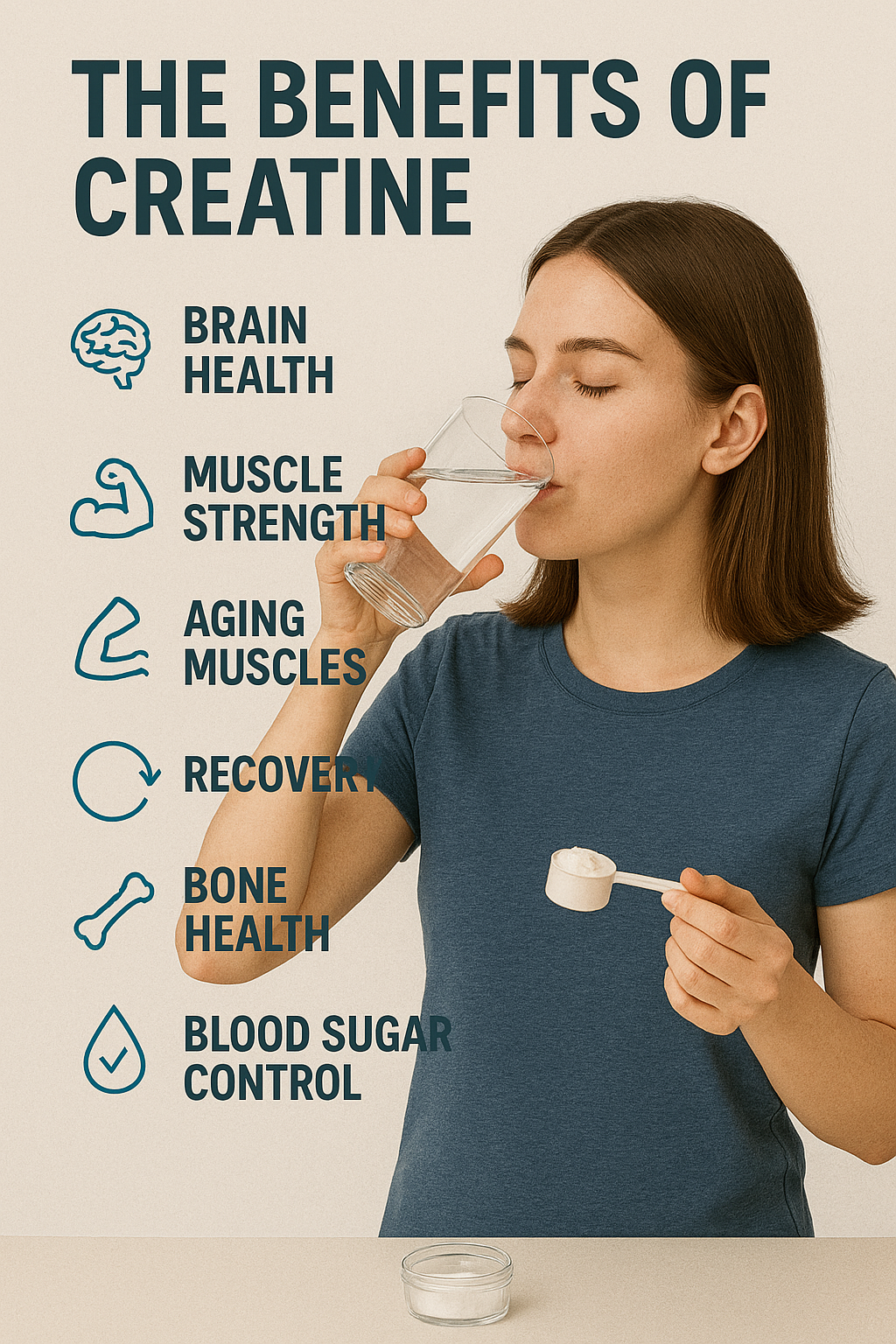🧪 What Is Creatine?
Creatine is a naturally occurring amino acid derivative found mostly in your muscles and brain. About 95% of the body’s creatine is stored in skeletal muscle, where it helps produce energy during high-intensity activity. It’s made in the liver, kidneys, and pancreas from the amino acids arginine, glycine, and methionine.
The primary function of creatine is to help regenerate ATP (adenosine triphosphate)—the cellular "currency" of energy—especially during short, intense bursts of activity.
🧠 Creatine for Brain Health and Cognitive Function
Recent studies have uncovered creatine’s role in neurological health and mental performance:
- Cognitive Enhancement: Creatine supplementation has shown benefits in short-term memory, intelligence, and mental fatigue. A study in Psychopharmacology (2003) found that 5g of creatine per day for 6 weeks improved working memory and intelligence test scores in healthy young adults.
- Neuroprotection: Research in Neuroscience Letters (2001) suggests creatine may help protect neurons against oxidative stress, ischemia, and neurodegenerative diseases such as Parkinson’s and ALS.
- Depression and Mood: Studies show creatine may help improve mood in individuals with major depressive disorder (MDD), especially when used alongside antidepressants. In one RCT, women with MDD who took creatine showed faster and greater improvement in symptoms.
💪 More Than Muscle: Creatine in Aging and Recovery
Muscle Maintenance in Aging
Sarcopenia (age-related muscle loss) is a major contributor to frailty in older adults. Creatine has been shown to:
- Improve muscle strength and lean mass in the elderly
- Enhance the effects of resistance training in people over 50
- Support functional independence and reduce fall risk
Injury Recovery & Rehab
Creatine can speed up recovery by:
- Enhancing muscle regeneration post-injury
- Reducing inflammation and oxidative stress
- Supporting recovery in orthopedic and post-surgical rehab, especially when paired with physical therapy
A 2021 meta-analysis in Nutrients concluded that creatine supplementation significantly improved muscle performance and lean mass recovery in older adults during rehabilitation.
⚖️ Other Applications: From Blood Sugar to Bone Health
- Glucose Tolerance: Creatine may improve glycemic control, especially when paired with exercise. It enhances glucose transporter (GLUT-4) translocation in muscles, improving insulin sensitivity.
- Bone Density: Animal and preliminary human studies suggest creatine may help maintain bone mineral density, likely due to its anabolic effects on muscle, which indirectly supports skeletal health.
- Mitochondrial Support: Creatine helps buffer mitochondrial stress and improve bioenergetics, making it promising in conditions like chronic fatigue syndrome, fibromyalgia, and multiple sclerosis.
🔍 What the Research Says About Creatine
- 🧠 Brain Health:
Creatine improves memory and reduces mental fatigue.
Source: Rae et al., Psychopharmacology, 2003 - 😊 Depression Support:
When combined with SSRIs, creatine speeds up and enhances response in people with major depressive disorder.
Source: Lyoo et al., American Journal of Psychiatry, 2012 - 💪 Aging Muscles:
Helps increase strength and lean muscle mass in adults over 50.
Source: Candow et al., Journal of Geriatric Physical Therapy, 2014 - 🔄 Rehabilitation & Recovery:
Boosts recovery outcomes and muscle performance in injury rehab.
Source: Chilibeck et al., Nutrients, 2021 - 🩸 Blood Sugar Control:
Enhances glucose tolerance and insulin sensitivity post-exercise.
Source: Gualano et al., Medicine & Science in Sports & Exercise, 2008 - 🦴 Bone Health Support:
May help maintain bone density indirectly by supporting lean muscle mass.
Source: Gerber et al., Bone, 2005 - 🔋 Mitochondrial & Neurological Support:
Creatine enhances energy metabolism and may help in conditions like fibromyalgia, MS, and fatigue syndromes.
Source: Tarnopolsky, M., Applied Physiology, Nutrition, and Metabolism, 2010
🧬 How to Supplement Creatine Safely
- Common Form: Creatine monohydrate is the most studied, safest, and cost-effective form.
- Dosage: A typical protocol includes:
- Loading phase: 20g/day split into 4 doses for 5–7 days
- Maintenance: 3–5g/day long-term
- Side Effects: Minimal. Some may experience bloating or water retention during the loading phase. No evidence supports the myth of kidney damage in healthy individuals.
💡 Tip: Take creatine with a carbohydrate-containing meal to enhance absorption (due to insulin-mediated uptake).
🌟 Bottom Line: Creatine Is for Everyone
Creatine is one of the most researched, safe, and multi-functional supplements on the market today. While it may have started in the world of sports performance, it’s now proving its value in cognitive health, aging, metabolic support, mental well-being, and recovery.
Whether you're an athlete, a parent, a senior, or just someone looking to feel better and age stronger, creatine could be the simplest addition to your wellness routine with the biggest return.
This blog is for educational purposes only and not a substitute for professional medical advice. Consult a healthcare provider before starting any new treatment. Outcomes and experiences discussed may vary. For immediate medical concerns, contact your physician.
